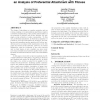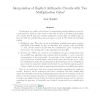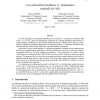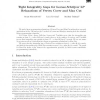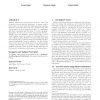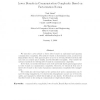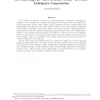134
click to vote
STOC
2007
ACM
16 years 2 months ago
2007
ACM
The design of algorithms on complex networks, such as routing, ranking or recommendation algorithms, requires a detailed understanding of the growth characteristics of the network...
123
click to vote
STOC
2007
ACM
16 years 2 months ago
2007
ACM
In this paper we consider the problem of constructing a small arithmetic circuit for a polynomial for which we have oracle access. Our focus is on n-variate polynomials, over a fi...
122
click to vote
STOC
2007
ACM
16 years 2 months ago
2007
ACM
In 1998, Impagliazzo and Wigderson [IW98] proved a hardness vs. randomness tradeoff for BPP in the uniform setting, which was subsequently extended to give optimal tradeoffs for t...
121
click to vote
STOC
2007
ACM
16 years 2 months ago
2007
ACM
We study linear programming relaxations of Vertex Cover and Max Cut arising from repeated applications of the "lift-and-project" method of Lovasz and Schrijver starting ...
99
Voted
STOC
2007
ACM
16 years 2 months ago
2007
ACM
114
click to vote
STOC
2007
ACM
16 years 2 months ago
2007
ACM
We introduce a new method to derive lower bounds on randomized and quantum communication complexity. Our method is based on factorization norms, a notion from Banach Space theory....
138
click to vote
STOC
2007
ACM
16 years 2 months ago
2007
ACM
We present a polynomial time approximation scheme (PTAS) for the minimum feedback arc set problem on tournaments. A simple weighted generalization gives a PTAS for KemenyYoung ran...
